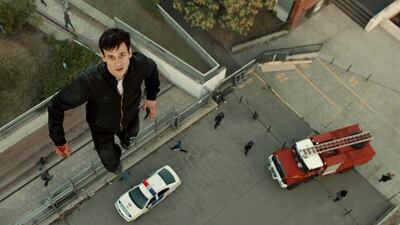Immigration is the hot topic at Cannes this year, according to festival director Thierry Frémaux, but it has nothing to do with festival programmers.
“It’s not the festival trying to have a political edge,” Frémaux says. “It’s the artists who are being political.”
Hungarian director Kornél Mundruczó's film Jupiter's Moon, for example, which is in competition, is about a young immigrant who is shot while attempting to cross a border – and then discovers he can levitate. He escapes from a refugee camp and is pursued by the enraged camp director.
German filmmaker Fatih Akin's In the Fade, another of the 19 films competing for the coveted Palme d'Or, stars Diane Kruger as a woman grieving the death of her husband and son in a bomb attack in Germany.
At first Islamists are blamed, but it turns out the real culprits are neo-Nazis, and Kruger wants justice.
A Drowning Man, by Dubai-born Danish-Palestinian director Mahdi Fleifel, is up for the Best Short Film award. Backed by the Arab Culture Fund, the 15-minute film tells the story of a refugee trying to survive in Athens. Fleifel won the Best Documentary prize at the 2012 Abu Dhabi Film Festival with his feature film, A World Not Ours.
Out of Competition, veteran actor Vanessa Redgrave's directorial debut, the documentary Sea Sorrow, explores the historical context of the migrant crisis. It draws parallels between Shakespeare's The Tempest and the tragic story of Syrian three-year-old Alan Kurdi, whose lifeless body washed up on a Turkish beach after the overloaded boat he was on, with his family and other refugees, capsized. It also focuses on ordinary people, including an Afghan former headmistress Redgrave met in Greece.
The Un Certain Regard section is normally where to find noteworthy films from auteurs that just missed out on selection for the main competition. In recent years it has gathered a reputation for being where to catch the festival’s best films. There are two films from the region screening in this section this year.
Tunisia has produced some of the finest cinema in the region over the past few years and it looks like this trend will continue with Kaouther Ben Hania's Beauty and the Dogs. It is about a young Tunisian woman who has to confront her mysterious assailant over the course of a night.
Karim Moussaoui's Until the Birds Return is set in present-day Algeria where past and present collide in the lives of a newly wealthy property developer, a young woman torn between the path of reason and sentiment and an ambitious neurologist impeded by wartime wrongdoings. Together, their three stories plunge us into the human soul of contemporary Arab society.
Also showing in Un Certain Regard is Dregs, an Iranian film by Mohammad Rasoulof that tells the story of a man who leaves city life behind to work on a goldfish farm in the north of Iran. There he comes up against a corporation exploiting the land for their own ends.
The Directors’ Fortnight section was created by the French Director’s Guild after the events of 1968, when the Cannes film festival was abandoned as part of a national wave of protests. It now heralds itself as the place to discover new talent.
This year there is a focus on emerging filmmakers from Lebanon. The Lebanon Factory is a talent-development initiative involving creators from that country paired with emerging directors from around the world to work on a short film.
This year’s pairings are Ahmad Ghossein and Lucie La Chimia; Mounia Akl and Ernesto Vilalobos; Rami Kodeih and Una Gunjak and Shirin Abu Shaqra and Manuel Maria Almereyda Perrone.
As for films showing outside the main specialist sections, French documentarian Sonia Kronlund will unveil her feature debut, Nothingwood, about larger-than-life Afghan director and producer Salim Shaheen.
Indonesian director Mouly Surya will also make her Cannes debut with Marlina the Murderer In Four Acts, the story of a young woman who goes on an empowering search for justice after she is attacked by a gang.
The smallest section of the Cannes Film Festival is Critics' Week. It was from here that horror hit Raw emerged last year. This time there is much pre-festival buzz about animated film Tehran Taboo, in which director Ali Soozandeh depicts four young people from Tehran who are forced to break the taboos of society.
The Cannes Market, meanwhile, is the place to show trailers and clips of films that are not yet ready to screen in full, but will be coming our way in the next year. The Dubai Film Market will show five works in progress from the region, giving a first look at the productions to distributors, festival programmers and sales agents.
The participating films are Arkansas-set Marjoun and the Flying Headscarf by Susan Yousef, Joint Possession by acclaimed Moroccan director Leïla Kilani, Annemarie Jacir's much-anticipated third film Wajib, Yasmine Chouikh's Until the End of Time, and Poisonous Roses by Ahmed Fawzi Saleh.
• The Cannes Film Festival begins on May 17 and runs until May 28.
artslife@thenational.ae


